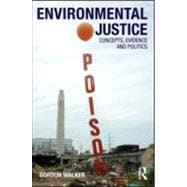
Note: Supplemental materials are not guaranteed with Rental or Used book purchases.
Purchase Benefits
What is included with this book?
| List of figures | p. viii |
| List of tables | p. x |
| List of boxes | p. xi |
| Preface | p. xii |
| Acknowledgements | p. xiv |
| Understanding environmental justice | p. 1 |
| The scope of environmental justice | p. 2 |
| Framing | p. 4 |
| Claim-making | p. 5 |
| Definitions of environmental justice and the case for multiplicity | p. 8 |
| Defining environmental inequality: the is-ought distinction | p. 12 |
| Summary | p. 14 |
| Structure of the book | p. 14 |
| Further reading | p. 15 |
| Globalising and framing environmental justice | p. 16 |
| The environmental justice movement in the US | p. 17 |
| The international travelling of the environmental justice frame | p. 23 |
| Environmental justice framings of global issues | p. 34 |
| The implications of 'going global' | p. 36 |
| Summary | p. 37 |
| Further reading | p. 38 |
| Making claims: justice, evidence and process | p. 39 |
| The three elements of claim-making | p. 40 |
| Justice concepts: how things ought to be | p. 42 |
| Evidence: how things are | p. 53 |
| Process: why things are how they are | p. 64 |
| Summary | p. 75 |
| Further reading | p. 75 |
| Locating waste: siting and the politics of dumping | p. 77 |
| Resisting waste: three cases | p. 78 |
| Unequal patterns of waste site locations | p. 84 |
| Environmental racism or markets? Analysing positions | p. 90 |
| Displacement, toxic imperialism and environmental blackmail | p. 94 |
| From redistribution to prevention | p. 100 |
| Summary | p. 101 |
| Further reading | p. 102 |
| Breathing unequally: air quality and inequality | p. 104 |
| Air quality and multidimensional claim-making | p. 104 |
| Evidence of air quality inequality | p. 107 |
| Explaining patterns of inequality | p. 111 |
| Vulnerability and impacts on health: the 'triple jeopardy' | p. 115 |
| The distribution of responsibility for air pollution | p. 118 |
| Justice in the air | p. 119 |
| Summary | p. 125 |
| Further reading | p. 126 |
| Flood vulnerability: uneven risk and the injustice of disaster | p. 127 |
| Characterising flooding: values, time and nature | p. 128 |
| Inequalities in flood exposure: who lives with flood risk and why? | p. 130 |
| Inequalities in vulnerability: who suffers flood impacts? | p. 135 |
| New Orleans and the Katrina flood | p. 139 |
| Justice and flooding | p. 148 |
| Summary | p. 154 |
| Further reading | p. 155 |
| Urban greenspace: distributing an environmental good | p. 156 |
| Greenspace as a 'good thing' | p. 157 |
| Always a good thing? Contested meanings of urban greenspace | p. 160 |
| Greenspace and social difference: evidence claims and inequality | p. 163 |
| Greenspace and justice | p. 173 |
| Summary | p. 177 |
| Further reading | p. 178 |
| Climate justice: scaling the politics of the future | p. 179 |
| Challenges for climate justice | p. 182 |
| Impacts, vulnerabilities and adaptation | p. 186 |
| Mitigation, responsibilities and transitions | p. 198 |
| Towards integration in climate justice | p. 209 |
| Summary | p. 212 |
| Further reading | p. 213 |
| Analysing environmental justice: some conclusions | p. 214 |
| There is value in understanding exactly how social differentiation exists and how it is experienced in environmental terms | p. 215 |
| Environmental inequalities are constituted by more than spatial patterns of proximity and exposure | p. 216 |
| Recognising the methodological complexities and choices involved in generating empirical evidence is important in progressing understanding and in doing justice | p. 216 |
| It is necessary to distinguish between inequality and injustice and to reason carefully about why an inequality matters and to whom | p. 217 |
| Environmental justice is about more than just patterns of distribution; procedure, recognition and their detail also matter | p. 218 |
| Environmental justice is contested and involves political challenges | p. 219 |
| Environmental justice is an objective but also a process of 'working towards' | p. 220 |
| Bibliography | p. 222 |
| Index | p. 249 |
| Table of Contents provided by Ingram. All Rights Reserved. |
The New copy of this book will include any supplemental materials advertised. Please check the title of the book to determine if it should include any access cards, study guides, lab manuals, CDs, etc.
The Used, Rental and eBook copies of this book are not guaranteed to include any supplemental materials. Typically, only the book itself is included. This is true even if the title states it includes any access cards, study guides, lab manuals, CDs, etc.